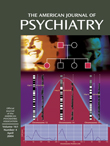Drs. Vythilingam and Nelson Reply
To the Editor: We are pleased that Dr. Black was interested in our article on psychotic depression and mortality. He states that he and his colleagues reported relevant data some time ago that contrast with our findings. Namely, they found no increase in suicide in psychotic depression. Dr. Black then notes that we did not address the issue of suicide.
The contrasting findings that Dr. Black refers to in his letter are unclear. We will reiterate our findings. First, we reported that psychotic depression was associated with all causes of mortality—not suicide. Thirty of the 37 deaths were from medical causes, and the increase in mortality in psychotic depression appeared to be from medical causes. In fact, Dr. Black’s findings are similar to ours in that the suicide rate in psychotic depression was not significantly different from the rate in nonpsychotic depression. Further similarities are highlighted by the absence of a significant relationship between DST results and suicide.
Second, Dr. Black overlooked our discussion of suicide in the Results and Discussion sections. In our group, there were three definite suicides and one death that was suspicious for suicide. These four cases were evenly split between the psychotic and nonpsychotic groups.
We do acknowledge, however, that the findings from our study are in contrast to those from another study that demonstrated an association between DST nonsuppression and suicide risk in patients with affective disorders (1). Prospective studies in larger numbers of subjects with psychotic and nonpsychotic depression could help tease out the complex relationships between neurobiology, clinical symptoms, and mortality.
1. Coryell W, Schlesser M: The dexamethasone suppression test and suicide prediction. Am J Psychiatry 2001; 158:748–753Link, Google Scholar



